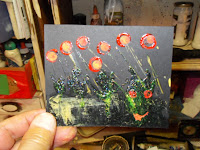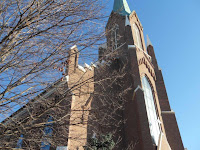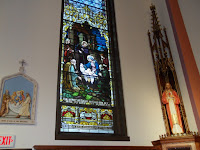Saturday, December 19, 2009
Monday, November 23, 2009
Thursday, November 19, 2009
The Poplar Fields by William Cowper
The poplars are felled, farewell to the shade
And the whispering sound of the cool colonnade:
The winds play no longer and sing in the leaves,
Nor Ouse on his bosom their image receives.
Twelve years have elapsed since I first took a view
Of my favourite field, and the bank where they grew,
And now in the grass behold they are laid,
And the tree is my seat that once lent me a shade.
The blackbird has fled to another retreat
Where the hazels afford him a screen from the heat;
And the scene where his melody charmed me before
Resounds with his sweet-flowing ditty no more.
My fugitive years are all hasting away,
And I must ere long lie as lowly as they,
With a turf on my breast and a stone at my head,
Ere another such grove shall arise in its stead.
'Tis a sight to engage me, if anything can,
To muse on the perishing pleasures of man;
Short-lived as we are, our enjoyments, I see,
Have a still shorter date, and die sooner than we.
Библия библейских стихов чтениях фортепианной музыки Дэвид Харт Американская
קריאת התנ"ך המקראי קריאת שירה מוסיקה לפסנתר דוד הארט האמריקאי
Біблія біблейскіх вершаў чытаннях фартэпіяннай музыкі Дэвід Харт Амерыканская
Auschwitz by Salvatore Quasimodo
ein Gedicht über Auschwitz von quasimodo durch lesen
Amerikaner David Hart, Künstler\From La prova scritta ditaliano, Milan: McGraw-Hill, 2003, Chapter 7.
Laggiù, ad Auschwitz, lontano dalla Vistola*,
amore, lungo la pianura nordica,
in un campo di morte: fredda, funebre*,
la pioggia sulla ruggine* dei pali*
e i grovigli* di ferro dei recinti*:
e non albero o uccelli nellaria grigia,
o su dal nostro pensiero, ma inerzia
e dolore che la memoria lascia
al suo silenzio senza ironia o ira.
Da quellinferno aperto da una scritta
bianca:Il lavoro vi renderà liberi
uscì continuo il fumo
di migliaia di donne spinte fuori
allalba dai canili* contro il muro
del tiro a segno* o soffocate urlando
misericordia allacqua con la bocca
di scheletro sotto le docce a gas.
le troverai tu, soldato, nella tua
storia in forme di fiumi, danimali,
o sei tu pure cenere* dAuschwitz,
medaglia* di silenzio?
restano lunghe trecce* chiuse in urne
di vetro ancora strette da amuleti,
e ombre infinite di piccole scarpe
e di sciarpe debrei: sono reliquie*
dun tempo di saggezza, di sapienza
delluomo che si fa misura darmi,
sono i miti, le nostre metamorfosi.
Sulle distese* dove amore e pianto
marcirono* e pietà, sotto la pioggia,
laggiù batteva un no dentro di noi,
un no alla morte, morta ad Auschwitz,
per non ripetere da quella buca
di cenere, la morte.
Glossario
Vistola = a river in Poland
Funebre = mournful
Ruggine = rust
Pali = pole
Grovigli = tangle
Recinti = enclosures
Canili = dog kennels
Tiro a segno = point blank shooting
Cenere = ashes
Medaglia = medal
Trecce = plaits
Saggezza/sapienza = wisdom
Reliquie = relics
Distese = plains
Marcirono = rot
Batteva = a verb used to characterize the sound of rain falling. Literally: to beat
From Epilogues to the Satires (1738) Lines 137 - 172 By Alexander Pope
From Epilogues to the Satires (1738) Lines 137 - 172 By Alexander Pope
聖經聖經讀詩歌朗誦鋼琴音樂大衛哈特美國
聖書の聖書の朗読詩の朗読ピアノハートアメリカン太郎
Bíobla biblical léamh filíochta ceol pianó léamh David Hart Meiriceánach
Библия библейских стихов чтениях фортепианной музыки Дэвид Харт Американская
קריאת התנ"ך המקראי קריאת שירה מוסיקה לפסנתר דוד הארט האמריקאי
Біблія біблейскіх вершаў чытаннях фартэпіяннай музыкі Дэвід Харт Амерыканская
Friday, November 6, 2009
Monday, November 2, 2009
Moi, Volant? par David Hart
show details 1:21 PM (21 hours ago)
Moi, Volant? par David Hart
Moi, Volant? par David Hart Me, Fly?
Moi, volant aux nuages grises Me flying in greying
Et blancs en haut legerement and whitening clouds
Flottant dans le ciel faineant Flying in the (lazy) sky
avec mon parapluei par-dessus (above) with my umbrella
Moi, quelquefois, je suis un sorte d'un Me Sometimes a sort of happy
jouet joli (village idiot)
Une vie de temps en temps From Time to time
Une fadaise fabuleusement a fabulous (trifle)
Et Etonnamment and (astonishingly)
J'ai l'intention de dechiffre I want to (decipher)
Les mysteres, les mysteres
de le ciel mystique mysteries, mysteries of the mystic sky
Maintenant les vents mugissement Now the winds (bellowing)
Ne blasphemez pa la nature! Don't blaspheme nature!
Bien heureux sont les gens simples (blessed) are the simple people
Bien seant (decent) and
Et Bienveillant (kind)
Sont les fleurs bigarrures are the (motley)
Au-dess
ous (Under) the great bluing and le grand ciel blueatre et blanchatre whitenin sky
Je blottis I (snuggle)
affectuesement et Affectionately and
Etourdissement (dizzily) with my
Avec Mes amours etincellement (sparkling) loves
Les nuages grimpants the (climbing) clouds
DHart2009USA
Posted by David Hart
Tuesday, October 20, 2009
Aristotle (Greek: Ἀριστοτέλης, Aristotélēs)
Aristotle's views on the physical sciences profoundly shaped medieval scholarship, and their influence extended well into the Renaissance, although they were ultimately replaced by Newtonian physics. In the biological sciences, some of his observations were confirmed to be accurate only in the nineteenth century. His works contain the earliest known formal study of logic, which was incorporated in the late nineteenth century into modern formal logic. In metaphysics, Aristotelianism had a profound influence on philosophical and theological thinking in the Islamic and Jewish traditions in the Middle Ages, and it continues to influence Christian theology, especially Eastern Orthodox theology, and the scholastic tradition of the Catholic Church. His ethics, though always influential, gained renewed interest with the modern advent of virtue ethics. All aspects of Aristotle's philosophy continue to be the object of active academic study today. Though Aristotle wrote many elegant treatises and dialogues (Cicero described his literary style as "a river of gold"),[1] it is thought that the majority of his writings are now lost and only about one-third of the original works have survived.[2]































